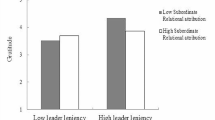Abstract
The removal of the President of the United States from office is a rare and significant event. This study investigated the influence of procedural fairness and blame attributions on punishment and support attitudes during the 1998 impeachment of President Clinton. This study assessed the influence of the procedural fairness of Clinton's behavior, procedural fairness of the Kenneth Starr/Congress investigation, satisfaction with Clinton policies, and blame attributions on punishment attitudes (i.e., whether Clinton should be removed from office) and support attitudes (i.e., whether individuals would vote for Clinton if an election were held today). Both the procedural fairness of Starr/Congress and procedural fairness of Clinton' behavior significantly influenced punishment and support attitudes. Procedural fairness of Clinton had indirect effects on punishment attitudes (through perceived blame of Clinton) and direct effects on support attitudes. Procedural fairness of Starr/Congress had direct effects on both punishment and support attitudes.
Similar content being viewed by others
REFERENCES
Agresti, A. (1996). An Introduction to Categorical Data Analysis, Wiley, New York.
Baron, R. M., and Kenny, D. M. (1986). The moderator–mediator variable distinction in social psychological research: Conceptual, strategic, and statistical considerations. J. Pers. Soc. Psychol. 51: 1173-1182.
Bies, R. J., Martin, C. L., and Brockner, J. (1993). Just laid off, but still a “good citizen?” Only if the process is fair. Employee Responsibilities Rights J. 6: 227-238.
Farwell, L., and Weiner, B. (1996). Self-perceptions of fairness in individual and group contexts. Pers. Soc. Psychol. Bull. 22: 868-881.
Feather, N., and Dawson, S. (1998). Judging deservingness and affect in relation to another's employment or unemployment: A test of a justice model. Eur. J. Soc. Psychol. 28: 361-381.
Huo, Y. J., and Tyler, T. R. (2001). Ethnicity, identities, and the basis of support for authorities. In: Musheno, M., Bowers, L., and Goldberg, D. T. (eds.), Between Law and Culture, University of Minnesota Press, Minneapolis, MN, pp. 195-206.
Kershaw, T., and Alexander, S. (1998) Justice Norms, Salience, and Political Justice Judgments, Paper presented at the 1998 SPSSI Convention, June, Ann Arbor, MI.
Kershaw, T., and Alexander, S. (1999). The Influence of Micro, Macro, and Procedural Justice on Attitudes Toward Government, Paper presented at the 1999 Annual convention of the Midwest Psychological Association, April, Chicago, IL.
Kershaw, T., and Alexander, S. (2001). Victims and Justice: What is Fair and Who is to Blame? Poster presented at the 13th annual convention of the American Psychological Society, Toronto, ON.
Lind, E. A., and Tyler, T. R. (1988). The Social Psychology of Procedural Fairness, Plenum, New York.
Nagelkerke, N. (1991). A note on the general definition of the coefficient of determination. Biometrika 78: 691-692.
Rasinski, K., and Tyler, T. R. (1988). Fairness and vote choice in the 1984 Presidential election. Am. Polit. Q. 16: 5-24.
Sigall, H., and Johnson, M. (1998). The relationship between political preferences and judgments of President Clinton's integrity depends on cognitive complexity. J. Appl. Soc. Psychol. 28: 1465-1476.
Smith, H. J., and Tyler, T. R. (1996). Justice and power: When will justice concerns encourage the advantaged to support policies which redistribute economic resources and the disadvantaged to willingly obey the law? Eur. J. Soc. Psychol. 26: 171-200.
Stroessner, S., and Heuer, L. (1996). Cognitive bias in procedural justice: Formation and implications of illusory correlations in perceived intergroup fairness. J. Pers. Soc. Psychol. 71: 717-728.
Thibaut, J., and Walker, L. (1975). Procedural Justice, Erlbaum, Hilsdale, NJ.
Tyler, T. R. (1990). Why People Obey the Law, Yale Press, New Haven, CT.
Tyler, T. R. (1997). The psychology of legitimacy: A relational perspective on voluntary deference to authorities. Pers. Soc. Psychol. Rev. 1: 323-345.
Tyler, T. R., Rasinski, K., and McGraw, K. (1985). The influence of perceived injustice on the endorsement of political leaders. J. Appl. Soc. Psychol. 15: 700-725.
Tyler, T. R., and Smith, H. J. (1998). Social justice and social movements. In: Gilbert, D. T., and Fiske, S. T. (eds.), The Handbook of Social Psychology, McGraw-Hill, Boston, MA, pp. 595-629.
Author information
Authors and Affiliations
Rights and permissions
About this article
Cite this article
Kershaw, T.S., Alexander, S. Procedural Fairness, Blame Attributions, and Presidential Leadership. Social Justice Research 16, 79–93 (2003). https://doi.org/10.1023/A:1022978127931
Issue Date:
DOI: https://doi.org/10.1023/A:1022978127931




